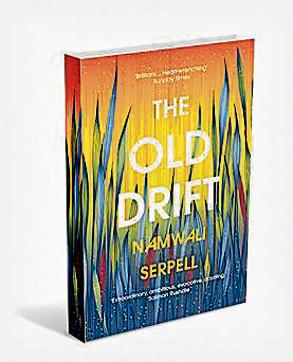I write for the curious, says Namwali Serpell, winner of the Arthur C Clarke award
The Old Drift is a sweeping family saga trailing four generations of three overlapping families — Black, White and Brown — but it is really the story of a nation, Zambia.
Namwali Serpell’s stupendous debut, The Old Drift, has been called ‘stealth sci-fi’; ‘Marquezian’, for its grand, epic sweep and magical realism, and a work of ‘Afro-futurism’.

The stealth sci-fi tag came from the jury that conferred upon it the Arthur C Clarke Award, the prestigious prize given out annually to an outstanding work of science fiction first published in the UK.
Serpell, 39, is a Zambian author who teaches English literature at Harvard. In The Old Drift, she places her characters in a story set in Zambia, with episodes in Italy, India and England, through Zambia’s colonisation, its fight for independence, its ill-fated space programme of the ’60s, and its battle against the AIDS epidemic.
The now is a techno-future, an age of mass surveillance and drone warfare. The sweeping tale trails four generations of three families — Black, White and Brown — down to a revolutionary generation of the future young.
“I did a lot of research to conjure the near-future inventions in my novel. I read about mosquito entomology, about HIV/AIDS, about the engineering of micro-air-vehicles. I wrote science fiction, not because it’s set in the future, but because I used real science to provide a basis for a fictional story,” Serpell told Wknd.
Born to a White psychologist and a Black economist, Serpell moved with her parents to America when she was eight. She says she almost majored in microbiology, but instead graduated in English at Yale and got a PhD from Harvard.
“English is my first language and English is an African language. My parents each spoke a different Zambian language so we grew up speaking English at home, with bits of Nyanja and Bemba thrown in,” she says.
Serpell names the Indian authors Arundhati Roy and Salman Rushdie as “very big influences” on her writing. “I was deeply honoured that Rushdie reviewed my novel in The New York Times Book Review,” she says.
In the review, Rushdie called the book an “extraordinary, ambitious, evocative first novel… [that] contributes powerfully to this new wave [of African literature]. The novel’s greatest strength lies in its creation of three unforgettable female characters. Agnes, the white upper-class English girl, loses her sight and falls in love with a black man without knowing he’s black, and, expelled from her family, follows him to Africa to become a gentle, grand presence throughout the book. Matha, who, following a heartbreak, is afflicted by endless, unstoppable tears for the rest of her life, becomes known as the ‘crying woman’. Most striking of all is Sibilla, who suffers from extreme hirsutism, every part of her body sprouting luxuriant hair…it’s a dazzling debut.”
How Serpell views history is best echoed by Ronald, the scholar Agnes falls in love with. Of him, Serpell as narrator says in the book: “During his time at university, Ronald had learned that history was the word the English used for the record of every time a white man encountered something he had never seen and promptly claimed it as his own, often renaming it for good measure. History, in short, was the annals of the bully on the playground.”
Serpell is political in the real world too. “It was only in college that I really started to say I’m Black, because, in America, I’m Black, and that’s how I’m recognised,” she has said in an interview to the US’s National Public Radio. “I remember very specifically a kid asking me in the cafeteria in fifth grade, what are you, not, who are you, and not what race are you, but what are you? And what she meant was, are you Black or White?”
After winning the award, she tweeted: “I won… within an hour of hearing that the cops who killed Breonna Taylor weren’t charged. To honor Breonna and the ongoing fight against state-sanctioned violence, I’m donating the £2020 prize money to bail funds for protestors. Join me.”
Serpell says she’s already working on her next book — set in the US, a cross between a family drama about mourning and a crime novel. “I write for pleasure and because I can’t not write — I’ve tried,” she says. “And I write for curious readers.”

Why Namwali Serpell is creating a stir
Her first novel, The Old Drift (Hogarth, 2019), has won her the Windham-Campbell prize for fiction, the Arthur C Clarke award for sci-fi, and the LA Times Art Seidenbaum Award for first fiction.
She started writing it in college, in 2000, and worked on it off and on in graduate school. Along the way, she published some pieces of it as short stories. “By the time I sold the novel to Hogarth in 2015, I had a scattered third of it written, and I finished a full draft by 2017. So I took seventeen years to complete it, but I wrote most of it in two years,” she says.
India features in her book. One of her characters, Balaji, is from Tirupati. His daughter, Naila, travels to his hometown after he dies, so part of the novel is set there. Serpell visited the Tirupati temple in 2015, while on a month-long trip to India for a writers’ residency.






